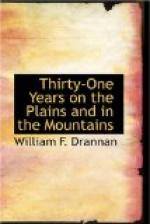I thought of my dying horse who had been such a faithful servant and carried me out of so many tight places, and when I would think of him I could fancy that I could see him raise his head and whinny at me as he had done that evening in his dying moments, seemingly asking me for help, and I could not keep the tears from my eyes. As soon as it was light I started for camp, arriving there about ten o’clock that morning. The men in camp had given me up and did not expect to ever see me any more, thinking that the Apaches had got me. I told the men that we would have to leave this part of the country now, and that too, just as soon as I could get a bite to eat and get my saddle repaired. While the boys pulled up and started to move camp I saddled up another horse and took my back track, traveling very cautiously, thinking they would try to follow me out, and I wanted to watch their movements and see whether they had reinforced or not. I told the boys to move northeast and where to camp, the place being ten miles from where we were then, and not to build any fire that night, also that I would be in camp some time before morning this time, I was very cautious not to be surprised the second time. I rode back within a mile of where my dead horse lay, but could not see any Indians, so I finally concluded that it had been a small hunting party, and seeing that they could not scare me out of my rock pen by their ferocious charges, accompanied by a war-whoop that would make the hair stand on the bravest mountaineer’s head, they had abandoned the idea altogether and had no doubt left the ground before I started to crawl away from my rock pen, which had been the means of saving me from falling their victim.
I returned to camp, arriving shortly after dark. We moved north, the men prospecting the country as we went and I scouting, keeping a sharp lookout to prevent a surprise party, but we did not see any more Indians during the entire winter. We struck the Colorado river at the mouth of the Green river.
Mr. Campbell concluded that he would go to southern Nevada; taking a southwesterly course from Green river, I piloted them about one hundred miles and they now being in a country where they were perfectly safe as far as hostile Indians were concerned, I left the party, and the most of them it has never been my pleasure to meet since. I met one of the party by the name of Freeman in Seattle in the year of 1889. At that time he was settled down in his old neighborhood in Illinois and had a wife and five children. I can truthfully say that I never met five better and more agreeable men to travel with in all my career than those men were. While with them I never saw one of them apparently out of humor with his companions or heard one use any kind of language than that of a gentleman. Leaving the party I struck for Salt Lake City. I had no trouble in finding the way, or otherwise, and arrived at Fort Douglas about the first of March.




